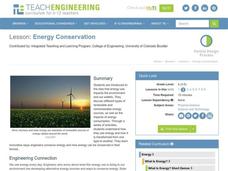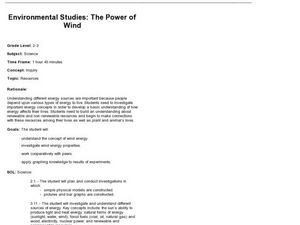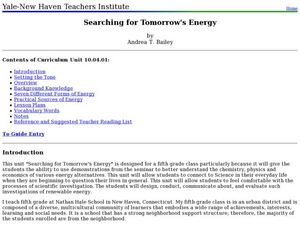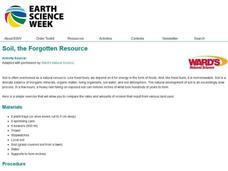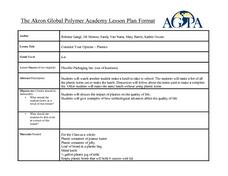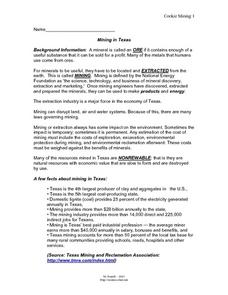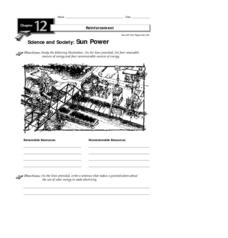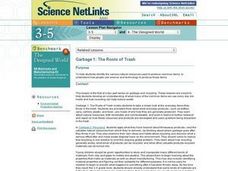Curated OER
Mission Possible: Energy Trade-offs
Teams of electrical engineers work together to develop plans for increasing electricity to a fictitious, but growing community. They consider different sources of electricity, both renewable and nonrenewable, the cost of building and...
Curated OER
Renewable vs. Non-Renewable Resources
Fifth graders are introduced to the important topic of renewable, and non-renewable, resources. They are expected to be able to correctly categorize different types of resources as renewable or non-renewable. Another emphasis of this...
Curated OER
Energy Conservation
Students investigate energy conservation. In this energy conservation and analyzing data instructional activity, students identify and explain several energy sources and research renewable and nonrenewable energy sources. Students use...
Curated OER
Our Natural Resources
Soil, water, fish, wildlife and forest are the main resources that are reviewed in this PowerPoint. Overuse and waste versus the value of the resources used and the long-term impact is covered in this clear presentation. It would be good...
It's About Time
Energy from Coal
If plastic is derived from fossil fuels and fossil fuels come from dead dinosaurs, does that mean that plastic dinosaurs are made from real dinosaurs? This lesson goes into depth about coal and other fossil fuels. First the instructor...
Curated OER
Renewable vs. Non-Renewable Resources
Here's a fine lesson on renewable and non-renewable sources of energy for your 5th graders. In it, learners list a number of natural resources on the board, then try to sort the resources into appropriate categories. This helps them to...
Curated OER
Chocolate Chip Cookie Mining
Students explore nonrenewable energy resources. In this coal lesson, students investigate how coal is formed and how it is used as a source of energy. Students mine for "coal" using toothpicks and chocolate chip cookies.
Curated OER
Renewable Energy Sentences
Students construct sentences using nouns and verbs from a "renewable energy" word bank. In this cross curriculum ecology and sentence structure grammar and mechanics instructional activity, students listen to the book Our Earth: Clean...
Curated OER
Sources of Energy
Seven slides simplify sources of energy for your upper elementary science superstars. This concise presentation defines energy, lists forms of energy, and then compares renewable to nonrenewable sources. Have viewers take notes, and then...
Curated OER
Environmental Studies: The Power of Wind
Investigate the prospect of wind as a renewable resource. Second and third graders make a pinwheel, answer critical thinking questions, and then attempt to use wind power to wind string. I would be more apt to use this lesson in a 1st or...
Curated OER
Natural Resources: Can We Use Them Forever? Grade 2
Bright colors and animation are great ways to attract a young students attention. Students are introduced to the concepts of renewable and non-renewable resources as they pose the question, will our resources be around forever? This...
Curated OER
Searching for Tomorrow's Energy
Fifth graders investigate energy. In this biology lesson plan, 5th graders will learn about energy, fossil fuels, and renewable and nonrenewable resources. Students will be participating in three lab activities which are described in...
Curated OER
Applied Science - Built Environment (2) Pre Lab
Second graders review how our society affects nature. In this energy lesson, 2nd graders discuss the different ways that energy is collected. They review renewable and nonrenewable energy sources.
Curated OER
Soil, the Forgotten Resource
Students discuss soil understanding that is is often overlooked as a natural resource. In this science lesson, students recognize that we depend on it for energy in the form of foods. Students experiment with six boxes of soil to help in...
Curated OER
It Won't Last Forever
Students investigate the recycling process. In this recycling lesson, students set up a classroom program for recycling and set up recycling bins in various areas of the school. Students investigate other options to reduce waste.
Curated OER
Consider Your Options-Plastics
Students explore plastics and what plastics students use to pack a lunch. In this plastics lesson plan, students observe each other pack lunches and take note of all the plastics used in packing the lunch. They discuss the impact of...
Curated OER
Mining in Texas
For this mining and nonrenewable resources worksheet, students read about mining in Texas and simulate the extraction of nonrenewable minerals. They use cookies and their components to represent the minerals they will mine and they...
Curated OER
Sun Power
For this energy worksheet, students study an illustration to identify 4 renewable and 4 nonrenewable sources of energy. This worksheet has 9 short answer questions.
Curated OER
Comparing Fossil Fuels and Renewable Energy Sources
In this energy worksheet, students will complete a Venn diagram comparing and contrasting fossil fuels and renewable energy sources.
Curated OER
Why Are Fossil Fuels Limited?
In this fossil fuels worksheet, students will determine why fossil fuels are a limited resource and brainstorm possible solutions. This worksheet is a graphic organizer.
Curated OER
Wise Use of Our Resources
In this resources worksheet, students will categorize 10 resources as either a renewable or nonrenewable resource. Students will then complete 2 short answer questions.
Curated OER
Design a Recycling Game!
Students discover that recycling is using a product more than once so that natural resources can be saved and so that we won't need so many garbage dumps and landfills. They see that there are different ways to recycle. Students design a...
Curated OER
Global Resources: What Will You Do with Your Power?
Learners examine the human impact on natural resources. They read and discuss an article, evaluate nations regarding their environmental problem-solving, develop a presidential speech on the environment, and conduct a natural resources...
Curated OER
GARBAGE 1: THE ROOTS OF TRASH
Students identify the various natural resources used to produce common items; to explain how people use science and technology to produce those items.




